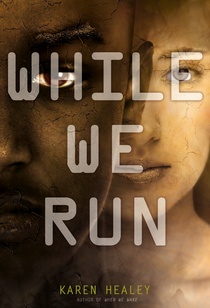
Little, Brown BYR, 368 pages
Expected US Release Date: October 22, 2013
Format/Source: ARC, via Around the World Tours - thank you!
Challenges: SARC 2013, Contemporary Challenge
Gerald Faust knows exactly when he started feeling angry: the day his mother invited a reality television crew into his five-year-old life. Twelve years later, he’s still haunted by his rage-filled youth—which the entire world got to watch from every imaginable angle—and his anger issues have resulted in violent outbursts, zero friends, and clueless adults dumping him in the special education room at school.
Nothing is ever going to change. No one cares that he’s tried to learn to control himself, and the girl he likes has no idea who he really is. Everyone’s just waiting for him to snap…and he’s starting to feel dangerously close to doing just that.
In this fearless portrayal of a boy on the edge, highly acclaimed Printz Honor author A.S. King explores the desperate reality of a former child “star” who finally breaks free of his anger by creating possibilities he never knew he deserved.
-------------------Goodreads summary


Expected US Release Date: October 22, 2013
Format/Source: ARC, via Around the World Tours - thank you!
Challenges: SARC 2013, Contemporary Challenge
Gerald Faust knows exactly when he started feeling angry: the day his mother invited a reality television crew into his five-year-old life. Twelve years later, he’s still haunted by his rage-filled youth—which the entire world got to watch from every imaginable angle—and his anger issues have resulted in violent outbursts, zero friends, and clueless adults dumping him in the special education room at school.
Nothing is ever going to change. No one cares that he’s tried to learn to control himself, and the girl he likes has no idea who he really is. Everyone’s just waiting for him to snap…and he’s starting to feel dangerously close to doing just that.
In this fearless portrayal of a boy on the edge, highly acclaimed Printz Honor author A.S. King explores the desperate reality of a former child “star” who finally breaks free of his anger by creating possibilities he never knew he deserved.
-------------------Goodreads summary

Notable Quote
I want to talk to her about my plastic-wrapped heart and how I think she's unwrapping it, but I think it's stupid. Anyway, it's more than my heart that's wrapped. My mouth is wrapped. My brain is wrapped. That's how it works when you grow up in the land of make-believe. To survive, you wrap and wrap and wrap until you're safe.

Knowing this was my first AS King, I expected to be absolutely blown away by this story. Ask the Passengers has been touted as A Book That Will Change You, everyone I know looks back on reading Everybody Sees the Ants with reverence…so I thought Reality Boy would be at the same level. And now, at the end…I was blown away, but in an entirely different way than I thought I’d be.
I didn’t immediately take to this story, while I was reading nor immediately after. It mostly made me incredibly sad. It was like watching a helpless, misunderstood boy from the sidelines who I wanted to reach out and help so badly, but could do absolutely nothing. I cringed, I wanted to cry for him, I wanted to punch people who would call him Crapper and not understand the toll it was taking on him. I really wanted to kill his psychopath sister and try to force her to see how she was wrecking absolutely everyone and everything around her.
I don’t like having strong negative emotions like that as I read – sure, occasionally, and that’s fine, that means it’s an evocative book. But I have a tough time dealing with it when it’s all the time, and I didn’t like that. I wanted something to at least give me hope, I wanted something to lift me. Hannah was a fair try, and she was a shimmer in an otherwise bleak world – but even she had her problems. Yes, that’s what made her work with Gerald so well, but it did nothing to ease all my seething. Probably the only parts that really worked that way for me were Gersdays. The entire concept of Gersday was fantastic, I loved that it’s his own world but still shows off a very human, creative side of him. Hallucinatory and damaged, yes, but still! It was good.
I also liked that they wanted to run away with the circus; and I loved that somehow, it wasn’t at all cliché. It just worked, and I thought it was a fun little destination and change in setting for Hannah and Gerald.
Oddly, this is one of the few books I’ve read in awhile that made me want to dive into the symbolism. I don’t know if it’s just my literary training – maybe none of this is supposed to be symbolic at all – but I felt like there were a lot of moments that really meant more than they appeared. The circus, the constant appearance of Disney characters in Gerald’s Gersdays, all his classmates in his Special Ed class, pretty much every time Lisi appeared in a flashback scene. Like I said, I have no idea if there is supposed to be more meaning, but I like that this book feels heavier than it really is.
I mentioned that this book blew me away, but in a much more subtle fashion than expected. As I look back and try to recall the points I want to review 3 weeks after actually reading it, I’m struck with how important this feels. Reality Boy needs to be read, to understand what can really be behind people’s actions; to see what can really spark anger and violence. Gerald is a real character, with nothing held back. He’s raw and emotional and incredibly representative of a niche we don’t often see in YA. Even though I actually don’t think I like him much, the development and how much depth his character has is something that stuns me. I feel like I remember more to him every time I look back.
Reality Boy presents a unique, interesting plot that actually relates to a lot more of us than we originally think. While I don’t think it’s quite for everyone yet, I do hope that one day it will be because there’s a lot to learn and be guided by within it.

I didn’t immediately take to this story, while I was reading nor immediately after. It mostly made me incredibly sad. It was like watching a helpless, misunderstood boy from the sidelines who I wanted to reach out and help so badly, but could do absolutely nothing. I cringed, I wanted to cry for him, I wanted to punch people who would call him Crapper and not understand the toll it was taking on him. I really wanted to kill his psychopath sister and try to force her to see how she was wrecking absolutely everyone and everything around her.
I don’t like having strong negative emotions like that as I read – sure, occasionally, and that’s fine, that means it’s an evocative book. But I have a tough time dealing with it when it’s all the time, and I didn’t like that. I wanted something to at least give me hope, I wanted something to lift me. Hannah was a fair try, and she was a shimmer in an otherwise bleak world – but even she had her problems. Yes, that’s what made her work with Gerald so well, but it did nothing to ease all my seething. Probably the only parts that really worked that way for me were Gersdays. The entire concept of Gersday was fantastic, I loved that it’s his own world but still shows off a very human, creative side of him. Hallucinatory and damaged, yes, but still! It was good.
I also liked that they wanted to run away with the circus; and I loved that somehow, it wasn’t at all cliché. It just worked, and I thought it was a fun little destination and change in setting for Hannah and Gerald.
Oddly, this is one of the few books I’ve read in awhile that made me want to dive into the symbolism. I don’t know if it’s just my literary training – maybe none of this is supposed to be symbolic at all – but I felt like there were a lot of moments that really meant more than they appeared. The circus, the constant appearance of Disney characters in Gerald’s Gersdays, all his classmates in his Special Ed class, pretty much every time Lisi appeared in a flashback scene. Like I said, I have no idea if there is supposed to be more meaning, but I like that this book feels heavier than it really is.
I mentioned that this book blew me away, but in a much more subtle fashion than expected. As I look back and try to recall the points I want to review 3 weeks after actually reading it, I’m struck with how important this feels. Reality Boy needs to be read, to understand what can really be behind people’s actions; to see what can really spark anger and violence. Gerald is a real character, with nothing held back. He’s raw and emotional and incredibly representative of a niche we don’t often see in YA. Even though I actually don’t think I like him much, the development and how much depth his character has is something that stuns me. I feel like I remember more to him every time I look back.
Reality Boy presents a unique, interesting plot that actually relates to a lot more of us than we originally think. While I don’t think it’s quite for everyone yet, I do hope that one day it will be because there’s a lot to learn and be guided by within it.
4 Stars / 5







 This Song Will Save Your Life by Leila Sales
This Song Will Save Your Life by Leila Sales














